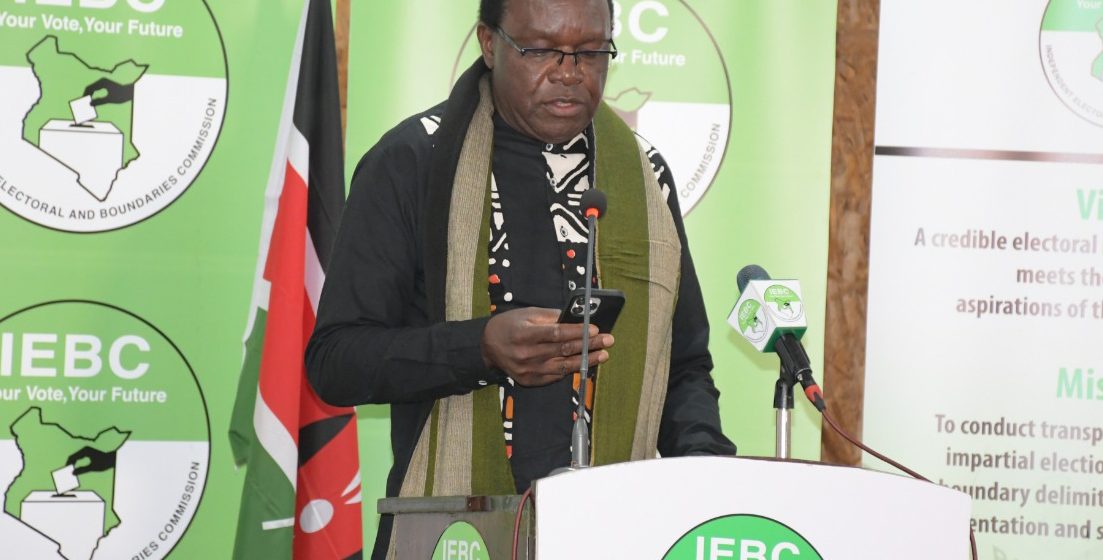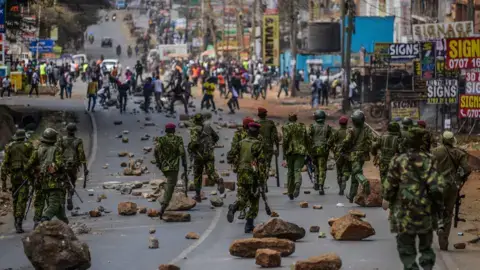|
LISTEN TO THIS THE AFRICANA VOICE ARTICLE NOW
Getting your Trinity Audio player ready...
|
On August 15, 2022, four Independent Electoral and Boundaries Commission (IEBC) commissioners led by Juliana Cherera, the vice-chairperson, stormed out of Bomas, the national tallying center for the presidential election, a few minutes before the announcement of the presidential election winner.
The four said they could not take ownership of the results just about to be announced due to their ‘opaque nature.’
In his defense, Justus Nyang’aya, one of the four commissioners, listed as the 6th respondent in the petition filed by Azimio presidential candidate and his running mate, wrote an explosive affidavit where he leveled serious accusations at the feet of Chairman Wafula Chebukati.
Nyang’aya, the IEBC commissioner tasked with overseeing the IT department during the polls, has filed an affidavit accusing Chebukati of running IEBC unilaterally.
In a 27-page document, Nyang’aya asserted the responsibility of conducting the elections in the Elections Act. And IEBC Act rests upon the whole IEBC Commission, where all the commissioners are involved in the decision-making process.
He said the role of the chairman of the commission is to announce the final results having been counted and verified by the commission.
However, he said Chebukati appointed himself the national returning officer and undertook the responsibility of running the elections process unilaterally, sidelining the commissioners, which he says contravened even the quorum principle where 4 commissioners would form a quorum in the decisions of the commission.
In defense of the assertions made while denouncing the results, Nyang’aya said the chairman ambushed him and the other commissioners a few hours before the announcement of the presidential results; hence they could not vouch for the accuracy, verifiability, and transparency of the results.
The commission in the running for the general elections had appointed Nyang’aya to handle ICT matters. He, however, said Chebukati took away the responsibility and assigned it to a commission staff member. Consequently, he was left to handle only the protocol matters on the same.
In an explosive revelation, Commissioner Nyang’aya said he was aware of a foreigner going by the Gudino Omor who used Server-ID’ O’ and had full access to the IEBC server from June 1, 2022, till after the elections period.
This foreigner could pull down original forms uploaded at the polling station and upload fresh ones without following the procedure by the commission of replacing an uploaded form onto the portal, Nyang’aya said in his affidavit.
Nyang’aya further disclosed that 377 unknown people accessed the server during the elections and whose explanations had not been formally made to the commission.
Moreover, the commissioner named three IEBC staff: Abdidahir Maalim, Moses Sunkuli, and Gideon Balaang, who he claimed would also pull down the result forms from the server and upload new documents without approval.
This foreigner could pull down original forms uploaded at the polling station and upload fresh ones without following the procedure by the commission of replacing an uploaded form onto the portal, Nyang’aya said in his affidavit.
These three officials also aided the IEBC chairperson in coming up with the results declared at Bomas during the results verification period, Nyang’aya said.
He said he was aware that whenever the officials uploaded new documents, they made corresponding changes in form 34B.
“The commissioners would later be required to read the results from form 34B at the national tallying center,” he said.
He stated that he received calls from the public informing him that some results announced at the national tallying center conflicted with those declared at the constituency level. Yet, he had no way of verifying the results, having been put into darkness through the whole process.
The commissioner said IEBC protocols required them to fill an error sheet if they found discrepancies in the results during the verification process on the floor of Bomas with the party agents. However, the chairperson did not provide the commissioners with the forms to evaluate the errors found.
He further says that upon sampling form 34As against the results captured in form 34Bs, he found glaring discrepancies in the results in the forms.
Raising doubts on the authenticity of the results that Chebukati declared, the commissioner claimed that due to the interferences highlighted; it became impossible to ascertain whether either candidate attained the constitutional threshold required for a presidential winner.
Further, he alleges the commissioners were not given a chance to ascertain the total number of votes cast from those identified through the KIEMS kit and those identified manually. It is worth noting that this figure is crucial for establishing the total number of votes cast whose percentage of 50 percent +1 vote determines the presidential winner.
By the time the presidential results were being declared by Chebukati, Nyang’aya says, results from 27 constituencies had not been announced. Chebukati delegated the responsibility of reporting these results to the commissioner, Prof. Abdi Yakub Guliye.
Guliye failed to publicly announce the results, saying in his affidavit that they had already been agreed upon by the agents, a fact that formed the basis for four commissioners rejecting the chairman’s declaring Deputy President William Ruto the winner of the presidential race.
The constitution allows the commission to declare a winner before declaring all the results if outstanding votes cannot affect the election outcome. Nyang’aya said he could not ascertain how many ballots were unaccounted for in the 27 constituencies and what impact they would have had in the final tally.
The commissioner indicated that the irregularities had not affected other elections in 5 elective posts apart from the presidential elections.






























LEAVE A COMMENT
You must be logged in to post a comment.